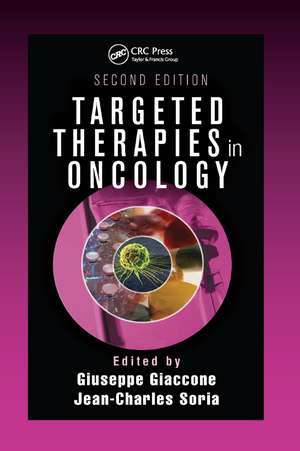Targeted Therapies in Oncology
Editat de Giuseppe Giaccone, Jean-Charles Soriaen Limba Engleză Paperback – 23 oct 2019
These therapies notably include:
- Targeted agents of immune checkpoints
- Signal-transduction inhibitors
- Antiangiogenic agents
- Vascular-disrupting agents
- Apoptosis modulators
- Stem cell inhibitors
- Tumor profiling for drug development
The book emphasizes the biology behind this new class of drugs as well as the clinical achievements obtained. The contributors to this volume stand at the cutting edge of cancer research and treatment around the world.
Preț: 390.44 lei
Preț vechi: 466.17 lei
-16% Nou
Puncte Express: 586
Preț estimativ în valută:
74.71€ • 81.41$ • 62.95£
74.71€ • 81.41$ • 62.95£
Carte tipărită la comandă
Livrare economică 23 aprilie-07 mai
Preluare comenzi: 021 569.72.76
Specificații
ISBN-13: 9780367379360
ISBN-10: 0367379368
Pagini: 498
Dimensiuni: 156 x 234 mm
Greutate: 0.83 kg
Ediția:2
Editura: CRC Press
Colecția CRC Press
ISBN-10: 0367379368
Pagini: 498
Dimensiuni: 156 x 234 mm
Greutate: 0.83 kg
Ediția:2
Editura: CRC Press
Colecția CRC Press
Public țintă
Professional ReferenceCuprins
Role of Next-Generation Sequencing Technologies. Signal Transduction Inhibitors of the HER Family. HER2 Inhibition and Clinical Achievements. Inhibiting the Phosphoinositide 3-Kinase/Akt/Mammalian Target of Rapamycin Pathway.
BRAF and MEK Inhibitors. KIT and KIT Inhibitors. Targeting the Fibroblast Growth Factor Receptor Pathway in Human Cancer. Anaplastic Lymphoma Kinase. MET Inhibitors. Targeting Stem Cells. The Cancer Super-Chaperone Hsp90: Its Posttranslational Regulation and Drug Targeting. Targeting Apoptosis Pathways. Targeting Angiogenesis. Antivascular Agents. Immunotherapy: Monoclonal Antibodies (CTLA4, PD-1, PD-L1, IL-18, and IL-21).
Vaccine Therapy and Integration with Other Modalities. Histone Deacetylase Inhibitors as Targeted Therapies.
Compounds Targeting Androgen Pathways. Targeting DNA Repair: PARP and Chk1 Inhibitors. Inhibitors Targeting Mitosis. Index.
BRAF and MEK Inhibitors. KIT and KIT Inhibitors. Targeting the Fibroblast Growth Factor Receptor Pathway in Human Cancer. Anaplastic Lymphoma Kinase. MET Inhibitors. Targeting Stem Cells. The Cancer Super-Chaperone Hsp90: Its Posttranslational Regulation and Drug Targeting. Targeting Apoptosis Pathways. Targeting Angiogenesis. Antivascular Agents. Immunotherapy: Monoclonal Antibodies (CTLA4, PD-1, PD-L1, IL-18, and IL-21).
Vaccine Therapy and Integration with Other Modalities. Histone Deacetylase Inhibitors as Targeted Therapies.
Compounds Targeting Androgen Pathways. Targeting DNA Repair: PARP and Chk1 Inhibitors. Inhibitors Targeting Mitosis. Index.
Notă biografică
Giuseppe Giaccone is a professor and associate director of the Lombardi Cancer Center at Georgetown University in Washington, D.C. He was previously the head of the Department of Medical Oncology, Free University Medical Center, Amsterdam, the Netherlands, and most recently the chief of the Medical Oncology Branch of the National Cancer Institute in Bethesda. Professor Giaccone has written more than 500 peer-reviewed scientific papers and several books and book chapters and is a board member of several international scientific journals. His fields of research include lung cancer and the development of novel anticancer agents. He was the chair of the Lung Cancer Cooperative Group of the European Organization for Research and Treatment of Cancer until 2000. He has organized a number of international conferences, such as the Topoisomerase Symposia and the Targeted Anticancer Therapy conferences.
Jean-Charles Soria is a professor of medicine at South-Paris University, France, and adjunct professor at the University of Texas MD Anderson Cancer Center. He is the chairman of the Early Drug Development Department at Gustave-Roussy, Villejuif, France. He is also a member of the Thoracic Multidisciplinary Committee at this institute. Professor Soria has authored over 300 peer-reviewed scientific papers, including publications as first or last author in the New England Journal of Medicine, the Journal of the National Cancer Institute, the Journal of Clinical Oncology, Clinical Cancer Research, and Annals of Oncology. He is a board member of several international scientific journals. His main research interests include early clinical development across solid tumors, pharmacodynamic biomarkers, lung cancer, and personalized medicine. He is also involved in translational research related to precision medicine and tumor progression, notably in lung cancer models (INSERM unit 981).
Jean-Charles Soria is a professor of medicine at South-Paris University, France, and adjunct professor at the University of Texas MD Anderson Cancer Center. He is the chairman of the Early Drug Development Department at Gustave-Roussy, Villejuif, France. He is also a member of the Thoracic Multidisciplinary Committee at this institute. Professor Soria has authored over 300 peer-reviewed scientific papers, including publications as first or last author in the New England Journal of Medicine, the Journal of the National Cancer Institute, the Journal of Clinical Oncology, Clinical Cancer Research, and Annals of Oncology. He is a board member of several international scientific journals. His main research interests include early clinical development across solid tumors, pharmacodynamic biomarkers, lung cancer, and personalized medicine. He is also involved in translational research related to precision medicine and tumor progression, notably in lung cancer models (INSERM unit 981).
Descriere
Major advances have been made in key pathways that control tumor progression. This has led to the development of new anticancer agents that can block the activity of proteins involved in neoplastic cell development and proliferation. This volume provides a concise panorama of existing targeted therapies and progress into future anticancer treatments. Topics include targeted agents of immune checkpoints, signal-transduction and stem cell inhibitors, antiangiogenic and vascular-disrupting agents, apoptosis modulators, and tumor profiling for drug development. The book emphasizes the biology behind this new class of drugs and the clinical achievements obtained.
